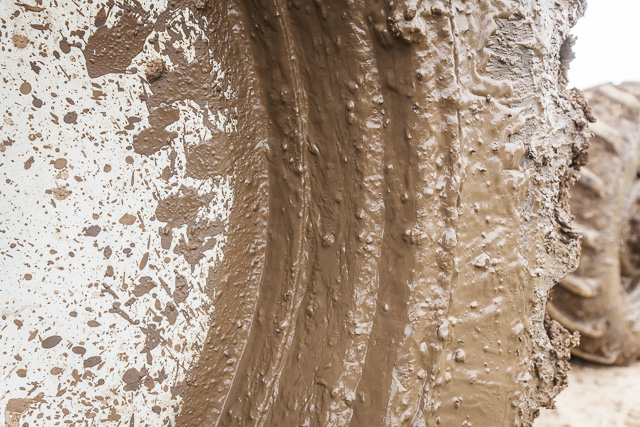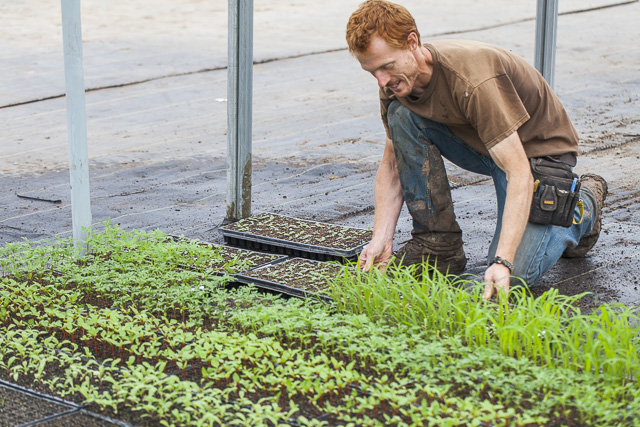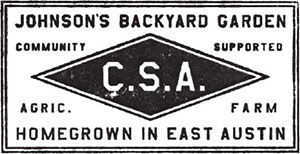
COVERED IN MUD
05/21/15 — Farm
 Tractor wheel caked in mud. Photo by Scott David Gordon
Tractor wheel caked in mud. Photo by Scott David Gordon
As a farmer in Central Texas, my relationship to the all of the rain we've been having is complicated. Since I'm all too familiar with the threat of drought, I never want to say anything bad about the rain. The truth is, we sure need it here - and lots of it.
And this is exactly what we are getting: days, and now going on weeks, of significant rain. In the long run, this is what we need to diminish the threat of drought, and it makes me happy to think of all of this beginning to refill our aquifers and lakes. As a farmer, I know my eye has to be on the future while simultaneously dealing with the problems at hand. For the future, this rain is a very good thing.
There are, however, problems at hand. If you talk to our Assistant Farm Manager, Mike Reed, he will tell you flat out, “It’s bad out there.” First of all, there is the omnipresent problem of mud. Everything – and I mean everything – is caked in it. Our packing shed crew does their best to wash and clean the harvest, but it is impossible for them to get off all of the mud.
When you get your CSA shares this week, you will see some of this mud, and as your farmer, I ask for your understanding as we work under these unusual conditions. We’ve had to harvest our potatoes in the rain, something we never do. In fact, we usually stop watering our potato plants two weeks prior to harvest so that the surrounding soil and the potato skins can stay dry and have a chance to harden up. Well, it didn’t matter one bit that we had stopped watering - Mother Nature had other ideas!
Given the forecast, we decided to go ahead and harvest the potatoes despite the wet conditions. What this means for you is that the potatoes in your CSA box are uncharacteristically muddy, and in this case, the mud is intentional. We purposely didn't wash it off. This is because the mud serves as a protective cover for the skin and allows the potatoes to cure a little longer before you cook them. I thank you for putting in the extra effort to clean these little guys - believe me, it will be worth the effort as they are delicious.
 Our Assistant Farm Manager, Mike, has been working hard in these unusually wet conditions. Photo by Scott David Gordon
Our Assistant Farm Manager, Mike, has been working hard in these unusually wet conditions. Photo by Scott David Gordon
All of this rain has slowed things down considerably for our crew. Mike also said, “everything is slower and harder to do.” Imagine trying to harvest in muddy fields – your boots get a little heavier with each step you take. Also, it has been impossible to stay on our planting schedule. Currently, our tractors are of limited use. Plus, guess who also really likes this rain? Bugs! That means we can’t do much direct seeding, either, because all of these rain-loving bugs just eat up the seeds we put down. Transplants do better, but it is a very slow process when done by hand in rain-drenched fields.
So, my hat goes off to our hard working crew. Typically, these wet conditions come and go pretty quickly, but this rain has hung around. And around. Our crew just keeps going, though. They are out there everyday, adapting to the changes the rain has wrought and doing it with incredible professionalism. I feel very lucky to have such fine people working for JBG. I imagine that they, like me, must also take the long-term view, since without rain, we would all be out of a job. It’s a frightening concept to think your water supply could disappear, and I think this is why no one wants to complain. We would take this rain over the alternative any day.
As this rain continues, I hope that you will also take a long-term view. We are working really hard to grow the best organic vegetables we can for you, but the weather is beyond our control. It sure is a mess out there, but the good news is all of this rain will help enable JBG to grow your vegetables for years to come.






 0 ITEMS IN CART
0 ITEMS IN CART 

